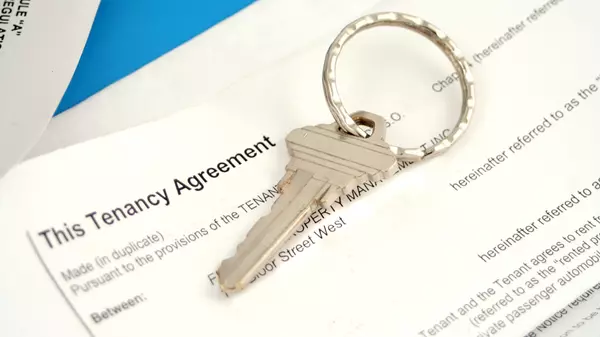10 Essential Tips for Buying Your Dream Home
Are you ready to embark on the exciting journey of buying your dream home? Whether you're a first-time homebuyer or a seasoned pro, purchasing a home is a significant decision that requires careful consideration. To help you make an informed choice and ensure a smooth buying process, we've compiled ten essential tips. From setting a budget to conducting thorough inspections, these guidelines will empower you with the knowledge you need to find your perfect abode.
Determine Your Budget
Before you begin your home search, it's crucial to establish a realistic budget. Assess your financial situation, including your income, savings, and expenses. Factor in additional costs such as property taxes, insurance, and maintenance. By knowing your budget upfront, you'll focus your search on homes that fit within your financial means.
Research the Market
To make a well-informed decision, conduct thorough market research. Explore the neighborhoods you're interested in and assess the average property prices, amenities, and proximity to schools, healthcare facilities, and other important establishments. This information will help you identify areas that align with your preferences and budget.
Get Pre-Approved for a Mortgage
Obtaining a pre-approval for a mortgage is a smart move before you start house hunting. It allows you to determine the loan amount you qualify for, giving you an advantage when negotiating with sellers. Approach multiple lenders, compare their terms, and select the one that offers the best interest rates and favorable conditions.
Engage a Reliable Real Estate Agent
Partnering with a reputable real estate agent can greatly simplify the home-buying process. An experienced agent will have in-depth knowledge of the local market, access to exclusive listings, and the negotiation skills to secure the best deal. Look for an agent who understands your requirements and communicates effectively.
Make a List of Must-Have Features
Before attending open houses or scheduling viewings, make a list of must-have features for your dream home. Consider the number of bedrooms and bathrooms, desired square footage, layout, and any specific amenities you desire. Having a clear checklist will help you evaluate properties objectively and avoid getting swayed by superficial aspects.
Visit Open Houses and Schedule Viewings
Once you've identified potential homes, attend open houses and schedule viewings. Take your time exploring each property, paying attention to its condition, layout, and neighborhood. Don't hesitate to ask questions and request additional information from the seller or listing agent. Visiting multiple properties will provide a broader perspective and help you compare your options.
Conduct Thorough Inspections
Before finalizing your decision, conduct thorough inspections of the properties you're seriously considering. Hire a professional home inspector to assess the structural integrity, electrical and plumbing systems, and overall condition of the house. This step ensures that you're aware of any potential issues or repairs needed before making an offer.
Consider Resale Value
While buying your dream home is an exciting prospect, it's also essential to consider its potential resale value. Opt for a property that aligns with the prevailing market trends and has features that appeal to a broad range of buyers. This way, if you decide to sell in the future, you'll have a higher likelihood of fetching a good return on your investment.
Review the Legal Documentation
Before signing any contracts, carefully review all legal documentation associated with the purchase. This includes the purchase agreement, property disclosures, and any contingencies. If you're unsure about any clauses or terms, consult with a real estate attorney who can provide guidance and ensure you're making an informed decision.
Trust Your Instincts
Finally, trust your instincts when it comes to buying your dream home. While it's essential to be logical and practical throughout the process, your intuition plays a vital role. If a property feels right and checks most of your boxes, it could be the one for you. Don't ignore your gut feeling and allow yourself to envision a future in that home.
In conclusion, purchasing your dream home requires careful planning and consideration. By following these ten essential tips, you'll be well-equipped to make an informed decision and navigate the home-buying process with confidence. Remember to stay within your budget, conduct thorough research, seek professional assistance, and trust your instincts. With these guidelines in mind, you're on your way to finding and acquiring the home you've always envisioned. Happy house hunting!
Effective Tenant Screening: Choosing the Right Tenants
Are you a property owner or a landlord looking for reliable and responsible tenants? Effective tenant screening is the key to ensuring a positive rental experience and minimizing risks. In this blog post, we will guide you through the process of choosing the right tenants and highlight the importance of thorough tenant evaluation. At [Your Company Name], we specialize in property management services and understand the significance of tenant screening in maintaining successful rental properties.
The Importance of Effective Tenant Screening
As a landlord, selecting the right tenants is crucial for several reasons. Firstly, it helps to minimize the risk of property damage, unpaid rent, and legal issues. Secondly, it ensures a harmonious living environment for all tenants, reducing conflicts and disruptions. Lastly, effective tenant screening can lead to longer tenancies and a more stable rental income.
Top Factors to Consider in Tenant Selection
Conducting Comprehensive Tenant Background Checks
A comprehensive background check is the foundation of tenant screening. It involves verifying the potential tenant's identity, employment history, and criminal record. Additionally, it is essential to screen for any previous evictions. By conducting thorough background checks, you can identify any red flags and make informed decisions about potential tenants.
Evaluating Tenant Credit and Financial Stability
Evaluating a tenant's creditworthiness and financial stability is crucial to ensure they can meet their rent obligations. Request credit reports to assess their payment history, outstanding debts, and credit score. Additionally, consider income verification and analyze their debt-to-income ratio. This step helps you identify tenants who are financially responsible and capable of fulfilling their rental obligations.
Verifying Tenant References and Rental History
Contacting previous landlords and verifying tenant references provides valuable insights into a tenant's behavior and rental history. Ask for references from previous landlords and speak with them to inquire about the tenant's payment punctuality, care for the property, and any other relevant information. This step helps you gauge the potential tenant's reliability and responsibility.
Assessing Tenant Compatibility and Communication Skills
Apart from financial considerations, it's important to assess tenant compatibility with the property and other tenants. Ensure that the tenant's lifestyle, habits, and requirements align with the property's rules and regulations. Additionally, evaluate their communication skills during interactions to ensure smooth communication throughout the tenancy.
Finalizing the Tenant Selection Process
After gathering all the necessary information and conducting thorough evaluations, it's time to make the final decision. Consider all the factors discussed above and choose the tenant who aligns best with your property requirements and expectations. Communicate the decision to the selected tenant and proceed with the necessary paperwork and lease agreement.
I offer professional property management services that encompass every step of the tenant screening process. I understand the importance of effective tenant selection and can assist you in finding reliable and responsible tenants for your rental property. Contact us today to learn more about our services and how we can help you ensure a successful rental experience.
Conclusion
Choosing the right tenants through effective tenant screening is crucial for maintaining a positive rental experience and minimizing risks. By following a comprehensive screening process that includes background checks, financial evaluations, reference verifications, and compatibility assessments, you can make informed decisions about potential tenants. At Emerald Coast Buy Sell Manage, we specialize in property management services and can assist you in every step of the tenant selection process. Trust us to help you find reliable and responsible tenants for your rental property.
The Future Unveiled: Real Estate's Transformational Trends and Technologies
Welcome to an all-encompassing guide that reveals the path to the future of real estate, delving into the profound trends and groundbreaking technologies shaping this industry. Within these pages, we will explore the remarkable advancements that are revolutionizing the ways in which we engage, buy, and sell properties. Prepare to embark on a journey where unprecedented opportunities and challenges await buyers, sellers, and industry professionals alike.
Emerging Trends and Technologies: A Constantly Evolving Landscape
Real estate, as an industry, consistently adapts to the ever-changing needs and demands of the market. In recent years, numerous emerging trends and technologies have emerged, reshaping the very fabric of real estate transactions and property management. Let us now delve into the key driving forces that are propelling the future of real estate.
A Paradigm Shift: The Rise of Sustainable and Green Buildings
As the environment assumes a prominent role in our collective consciousness, the emergence of sustainable and green buildings marks a monumental shift within the real estate industry. Visionary developers and builders are infusing eco-friendly features and energy-efficient technologies into their projects. These endeavors aim not only to diminish the carbon footprint but also to attract discerning buyers with a profound appreciation for the environment. From solar panels and rainwater harvesting systems to verdant roofs and energy-conserving appliances, sustainable buildings are altering the landscape of real estate.
Enhancing Convenience and Efficiency: The Era of Smart Homes
The ascent of smart home technology heralds a revolution in the way we inhabit and interact with our living spaces. These intelligent abodes are adorned with interconnected devices and systems that empower homeowners to effortlessly govern various aspects of their homes from afar. Voice-activated assistants and automated lighting foster an ambiance of convenience, while intelligent security systems and energy management tools ensure a heightened sense of security and optimal energy utilization. By seamlessly integrating artificial intelligence and the Internet of Things (IoT) into real estate, we are bestowed with a future wherein homes anticipate and cater to the unique needs of their inhabitants.
A New Dimension: The Fusion of Virtual Reality and Augmented Reality
The realms of Virtual Reality (VR) and Augmented Reality (AR) have gracefully permeated the real estate industry, offering immersive and interactive experiences to prospective buyers, sellers, and agents alike. Employing VR and AR technology, potential buyers can embark on virtual tours of properties without physically leaving their abodes. These cutting-edge technologies enable them to vividly envision renovations and interior designs, empowering them to make informed decisions. Real estate agents, too, harness the power of these technologies to showcase properties to clients situated far and wide, thereby saving invaluable time and resources. The marriage of VR, AR, and real estate effectively bridges the chasm between physical and digital experiences, redefining the way we explore and engage with properties.
Revolutionizing Transactions: The Blockchain Technology
Blockchain technology, known for disrupting various industries, now permeates the realm of real estate. Its decentralized and transparent nature obviates the need for intermediaries, simplifying property transactions. Powered by blockchain, smart contracts secure and expedite property transfers, reducing instances of fraud and cultivating trust among all involved parties. The immutable ledger characteristic of blockchain technology ensures the authenticity and precision of property records, thus streamlining the entire buying and selling process. As blockchain matures, its potential to reshape the future of real estate transactions becomes increasingly apparent.
The Dawn of Artificial Intelligence in Property Management
Artificial Intelligence (AI) is making remarkable strides within property management, enabling real estate professionals to optimize operations and deliver unparalleled services. AI-powered property management systems seamlessly automate administrative tasks, such as rent collection and maintenance requests, liberating property managers to devote their time and expertise to strategic endeavors. AI algorithms diligently analyze market trends and data, providing valuable insights regarding property values and investment prospects. By integrating AI into property management, efficiency, accuracy, and customer satisfaction reach new heights.
Aerial Perspectives and Inspections: Harnessing the Power of Drone Technology
Drones have revolutionized the manner in which we perceive and inspect properties. These unmanned aerial vehicles offer breathtaking aerial footage and captivating images, endowing potential buyers with a unique and compelling perspective of properties and their surroundings. Real estate agents leverage drones to capture awe-inspiring visuals for marketing purposes, eloquently showcasing properties in all their splendor. Additionally, drones play a pivotal role in property inspections, enabling efficient and cost-effective assessments of roofs, facades, and other hard-to-reach areas. With the aid of drone technology, the real estate industry reaches unprecedented heights of exploration and innovation.
As we conclude this comprehensive guide, it becomes evident that the future of real estate is an enticing amalgamation of transformative trends and awe-inspiring technologies. Sustainable buildings, smart homes, virtual and augmented reality, blockchain technology, artificial intelligence, and drones are revolutionizing the industry, propelling us into an era of limitless possibilities. Embrace this exciting juncture in real estate history, where the fusion of human ingenuity and technological marvels reshape the landscape of possibilities.
Buying vs. Renting: Which Option Is Right for You?
Buying vs. Renting: Which Option Is Right for You?
When it comes to finding a place to call home, one of the fundamental decisions is whether to buy or rent a property. Both options have their merits, and understanding the pros and cons of each can help you make an informed choice. In this blog post, we will delve into the factors that can influence your decision, including financial considerations, lifestyle preferences, long-term goals, and current market conditions. By the end, you'll have a clearer picture of which path is the right one for you.
Pros and Cons of Buying a Property
Owning a property offers numerous advantages, but it also comes with responsibilities and potential drawbacks. Let's explore the pros and cons:
Assess your financial readiness:
Before diving into homeownership, it's crucial to evaluate your financial readiness. Take stock of your personal finances, including your credit score, income stability, and existing debt. Assessing your financial situation will help you determine if buying a property aligns with your budget and long-term financial goals.
Consider long-term investment:
One of the significant advantages of buying a property is the potential for long-term investment. By building equity in your property over time, you can leverage it for future investments or use it to secure loans. Owning a property allows you to benefit from property appreciation and establish a valuable asset.
Understand maintenance responsibilities:
When you own a property, maintenance responsibilities fall on your shoulders. This means you need to allocate time and budget for repairs, upgrades, and general upkeep. While this can be rewarding for those who enjoy having control over their living space, it's essential to consider the associated costs and responsibilities.
Pros and Cons of Renting a Property
Renting a property provides its own set of advantages and disadvantages. Let's explore them further:
Evaluate short-term flexibility:
Renting offers greater flexibility, particularly for those with uncertain living arrangements or who prefer the ability to move frequently. Renting a property allows you to easily relocate without the burden of selling a property or dealing with the complexities of the real estate market.
Lower upfront costs:
Compared to buying a property, renting typically requires lower upfront costs. While homeownership often involves a down payment, closing costs, and other fees, renting generally requires a security deposit and the first month's rent. This lower financial barrier can make renting an attractive option, especially for those on a tight budget.
Limited maintenance responsibilities:
One of the benefits of renting is that you are not responsible for property maintenance. Landlords or property management companies handle repairs and maintenance tasks, saving you time, effort, and additional expenses. This is particularly advantageous for individuals who prefer a hassle-free living arrangement.
Financial Considerations:
When deciding between buying and renting, several financial factors come into play. Consider the following:
Calculate affordability:
Before buying a property, it's crucial to calculate affordability accurately. Evaluate your income, savings, and monthly expenses to determine how much you can comfortably allocate to mortgage payments, property taxes, insurance, and ongoing maintenance costs. Understanding your financial limits will guide you in making a sound decision.
Assess rental costs:
When renting, it's important to assess rental costs properly. Consider not only the monthly rent but also any additional fees or expenses associated with the rental agreement. Factor in potential rent increases over time and compare the total costs to determine if renting aligns with your budget and financial goals.
Lifestyle Factors:
Your lifestyle preferences play a significant role in deciding whether to buy or rent. Consider the following:
Evaluate stability requirements:
Think about your short-term and long-term stability needs. If you prefer the flexibility to move frequently for career opportunities or personal reasons, renting may be the better option. On the other hand, if stability and the ability to establish roots in a community are important to you, homeownership may align better with your lifestyle.
Consider customization options:
Homeownership allows for greater customization and personalization of your living space. If the ability to modify your home to suit your taste and preferences is essential, buying a property gives you the freedom to do so. Renting, while providing a comfortable living space, may have limitations on customization imposed by the landlord.
Long-Term Goals:
Your long-term goals should factor into your decision-making process. Consider the following:
Plan for future housing needs:
When deciding between buying and renting, consider your future housing needs. Are you planning to start a family? Do you anticipate a career change or potential relocation? Evaluating these factors will help you align your housing choice with your long-term plans and avoid unnecessary disruptions.
Assess investment aspirations:
If building wealth through real estate is part of your long-term goals, homeownership can provide opportunities for investment and financial growth. Property appreciation, rental income potential, and leveraging equity for future investments are factors to consider when weighing the advantages of buying a property.
Current Market Conditions:
The real estate market's state can significantly impact the decision between buying and renting. Consider the following:
Research local market trends:
Stay informed about the real estate market in your desired location. Analyze property values, supply and demand dynamics, and rental market trends. Understanding the current market conditions will help you make a more informed decision and potentially identify advantageous opportunities.
Seek expert advice:
Consulting with a knowledgeable realtor can provide valuable insights into the local market conditions. A professional real estate agent can guide you through the buying or renting process, helping you navigate the complexities and ensuring you make a well-informed decision that aligns with your goals.
Deciding between buying and renting is a significant choice that depends on various factors. By carefully considering financial considerations, lifestyle preferences, long-term goals, and current market conditions, you can determine which option is right for you. Remember, there is no one-size-fits-all answer, and what works for one person may not be suitable for another. Take the time to evaluate your priorities and make a decision that aligns with your unique circumstances and aspirations.
Are you ready to embark on your real estate journey? Our team of experienced realtors is here to assist you every step of the way. With a deep understanding of the local market, we can help you find your dream property or guide you in renting the perfect home. Contact us today at Emerald Coast Buy Sell Manage or visit our website to learn more about our services and how we can make your housing dreams a reality.

Jennifer Miller
Phone:+1(850) 490-5744




